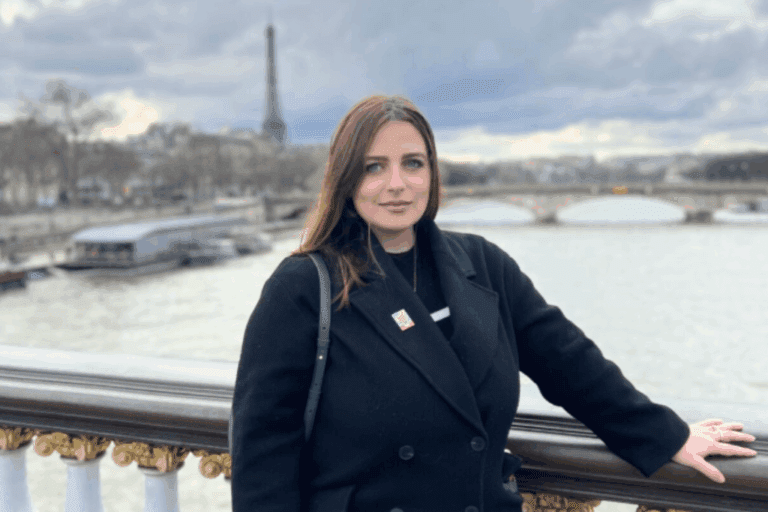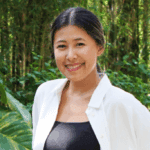
Verónica Lawson Vilches straddled two cultures growing up, splitting her time between Spain and the US.
“I’ve always had this bicultural upbringing that I think really represents who I am and how I never truly felt home in one place. Like I’ve always had my heart scattered in a million places,” she says.
Although her education until college was done in the States, she did switch schools a lot, having lived in four different states.
Because she moved so often, her high school credits got a bit complicated, so she decided to attend community college. She wasn’t pleased with that, though, because she had already completed advanced placement classes, which are college-level.
Upset with the situation, Vilches decided to take a year off from school to get some worldly experiences instead.
Instead of moving to Spain, though, she set her eyes on another European country: France.
But why not just move to Spain, her second home?
Apparently, that’s a question Vilches gets often.
“I always have said, when I was in Spain, I was kind of always considered the American. And then when I was in the US, I was always considered the Spaniard,” she says. “I felt like the acceptance of who I was as bicultural was never there 100%. It was always like I was from the other place. And that was very hard.”
While she was also driven by a genuine interest and love for French culture, her choice had to do with finding belonging too. She wanted to go to a neutral place where she can be half-Spanish, half-American, and fully accepted.

Vilches is now a polyglot who speaks four languages. Source: Verónica Lawson Vilches
Saying bonjour to a whole new language and culture
If you were born in the 90s, you might know a lovely animated show called “Madeline,” which features the eponymous main character with red hair, clad in a yellow outfit. One key thing about Madeline: she was French, studying at the Girl’s School in Paris.
Vilches grew up loving the character, which inspired a love for anything French. That was one driving force that got a young Vilches to pack up her bags and move to France as an au pair.
But she wasn’t intending to attend university there. It was only after speaking to her host family that Vilches realised she could get into college in France without needing any certification like SATs or credits — all that mattered was just a high school diploma.
“I ended up instead of doing just one year, to stay a second year, continue being a nanny, and go to French classes. And by the second year, I think it was March or April, I had been accepted into the Sorbonne,” she says.
Université Paris 1 Panthéon-Sorbonne is a public research university in Paris, France, known as the largest in the country for humanities and social sciences.
Raised bilingual, Vilches has a bit of an advantage when it comes to picking up the language since Spanish is also a Romance language. She’s now a bona fide polyglot, speaking about four languages.
“What works for me is moving. Obviously, I speak as someone who’s been able to move to a country and really just throw myself into it, but I think you need to throw yourself into it, whether that be watching a movie, whether that be reading a book,” she says. “I think you really don’t get to learn a language until you get to practise it, to be quite honest.”
When it comes to learning languages, Vilches typically starts with just comprehensible speaking without worrying about mistakes. That said, grammar is key in French. As Vilches puts it, the French are very proud of their language, so they will often correct you if you get something wrong.
“Which I’ve always loved,” she adds. “It doesn’t matter. Just like correct me, because that’s how that’s how I learn. But the French, they’ll do it without you even asking cause they’re very proud of their language.”

Today, Vilches works remotely out of Italy. Source: Verónica Lawson Vilches
Next stop: Italy
After picking up the French culture and language, Vilches decided to do it all again in Italy.
Due to personal circumstances, she had decided to move from France for a fresh start, and Italy seemed like a good choice. Today, she’s still residing there, working remotely in social media marketing as well as PR and content development.
This time around, she was able to adapt to the new environment more quickly.
“The first year I moved to France, I quickly just made American friends. As a foreigner, that’s what you’re attracted to, right? You’re already feeling like you’re in a foreign place, you want to feel closer to home. But I do think it’s very important to make friends who are from the country to at least try to adapt and learn from someone who lives there and who’s grown up there, and learn why things are done that way.”
In her first year in Italy, she didn’t have any primarily English-speaking friends, which was a great way for her to really adopt the language.
“But then afterwards I was like, okay, wait, but I need people who understand what I’m going through, you know?” she says. “I love my Italian friends, but sometimes I’m like, I have to go through this. And they’re like, what? There, it’s always a sweet balance, right?”
For those looking to study or work in Italy (or anywhere in the world), she recommends learning as much of the language as you can because she believes that that’s a sign of respect.
“And try to adapt. I think a lot of people come here and get upset at how slow things are, but then romanticise ‘dolce far niente,’ which means the sweetness of doing nothing,” she adds. “Try your best to understand that things aren’t going to be done the way they are at home.”
For those who have the privilege of travelling, studying, or working abroad, Vilches advises them to wield that privilege with intention.
“If you do have the opportunity to do it, of course do it,” she says. “I also say the same thing about learning a new language. If you can do it, definitely do it because I think it opens up your mind. You have more understanding of why the world is the way it is. But I also say you open up a world within yourself, because you have access to more words that describe yourself.”










